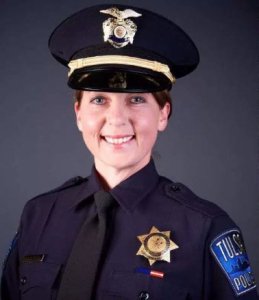Betty Shelby left the police department in Tulsa, Oklahoma, after she was acquitted of manslaughter in the 2016 fatal police shooting of an unarmed black man.

She returned Tuesday, and a lot of people weren’t happy about it.
Shelby, now working for a sheriff’s office in a nearby county, came back to Tulsa to teach a course on helping police officers “survive” the aftermath of controversial shootings such as the one in which she was involved.
“Participants will be exposed to many of the legal, financial, physical, and emotional challenges which may result from a critical incident in an effort to prepare (law enforcement officers) for the aftermath,” reads the course description on the website for the state Council on Law Enforcement Education and Training.
Critics call it ‘disrespectful’
Shelby has said she’ll teach fellow officers how to deal with what she calls the “Ferguson effect,” a reference to the 2014 shooting and subsequent unrest surrounding the fatal police shooting of Michael Brown in Ferguson, Missouri.
She told CNN affiliate KTUL the Ferguson effect is “When a police officer is victimized by anti-police groups and tried in the court of public opinion.”
Shelby’s teaching of the course — “Surviving the Aftermath of a Critical Incident” — sparked a protest Monday from those who say it’s insensitive and an insult for her to teach it, especially in Tulsa, where she, as a police officer, shot and killed Terence Crutcher during a September 2016 traffic stop.
“We believe the choice to have Betty Shelby lead a class on ‘how to survive the aftermath of a critical incident’ lacks empathy, is disrespectful to the Crutcher Family, and is intentionally divisive,” says a Facebook postfrom Aware Tulsa, a community group that coordinated the protest Monday in front of the courthouse in downtown Tulsa. “We are saddened that the Crutcher Family has not been given time to heal, and we want to continue to show our gratitude and respect for this wonderful family.”
But other officers can learn from what Shelby, now a patrol officer with the Rogers County Sheriff’s Office, went through, Rogers County Sheriff Scott Walton told CNN affiliate KJRH.
“It’s not about tactics. It’s not about when to shoot, when not to shoot. It’s about what she endured, what her family went through for the next eight months after her critical incident,” he told the TV station.
That line of thinking doesn’t work for the dozens of demonstrators who showed up to protest.
“It’s just sad for them to use a person as polarizing as Betty Shelby to, in fact, teach a critical incident class,” local pastor Rodney Goss told KJRH. “We know that the reality is she was the aggressor and that Terence Crutcher was the victim.”
CNN has reached out to the Rogers County Sheriff’s Office for comment from Shelby and is waiting to hear back.
Chuck Gerhart, the law enforcement council’s interim director, told CNN in an email that the course is not sponsored by his agency but is “provided by an outside source.”
The shooting
Crutcher’s death was one of a number of police shootings of unarmed black men across the United States in recent years that spurred debate about use of force.
The shooting happened after Crutcher’s SUV was found stalled in the middle of a street. A witness called 911 and said a man was running away from the vehicle, warning it was going to blow up.
Shelby arrived and approached the vehicle and cleared it, not seeing anyone inside. As she turned back to her patrol car, she saw Crutcher walking toward her. He alternated between putting his hands in his pockets and putting them in the air.
Crutcher did not comply with her commands to “show me your hands,” said Shelby, who also said Crutcher was sweating heavily and smelled of PCP chemicals. She said Crutcher put his hands on the SUV and moved to reach into the vehicle.
At that point, Shelby fired her weapon, killing Crutcher, who was found to be unarmed.
Shelby was charged with manslaughter and was later acquitted. She resigned from the Tulsa Police Department in August 2017.



















